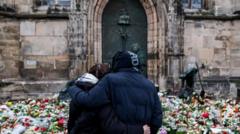The aftermath of the Christmas market attack in Magdeburg paints a somber picture of a community in distress. What should have been a festive season is overshadowed by grief, as the once-bustling market stands desolate, cordoned off with its stalls closed. The presence of police patrols contrasts sharply with the flickering red candles and memorial tributes laid out for the victims.
Local residents, like Lukas, a truck driver who frequents the area, lament the tragedy. "I work here in Magdeburg. I pass by the market every day. It’s heartbreaking," he shared, underlining the urgency for justice: "The perpetrator should be punished." While introspection and sorrow dominate, frustration brews over perceived security failings that allowed the attack to occur.
Critics have pointed fingers at authorities, alleging negligence in security preparations, a sentiment echoed by another mournful resident, Michael, who demanded, “We should have been prepared better.” Authorities, however, contest the claims, acknowledging that the attacker accessed the market through an emergency route but asserting that overall security measures were adequate.
The political undercurrents that follow such tragedies are unmistakable. Discontent with Chancellor Olaf Scholz and local politicians emerged, with locals accusing them of misusing taxpayer money and prioritizing personal agendas over community safety. “Empty promises” and attempts to shift blame onto opposition parties have stoked further ire, leading to a polarized environment amid national mourning.
Adding to the tension, a nearby demonstration occurred simultaneously with memorial services, featuring a group espousing far-right views with slogans like "Remigration now!" Speaker sentiments indicated a backdrop of societal divides, as some insisted that those unsupportive of Germany should leave.
As investigations proceed, authorities examine the motivations of the suspect, Taleb Al-Abdulmohsen, a Saudi national whose social media behavior indicates a possible wave of Islamophobic sentiment. His associations with far-right political discourse have raised troubling questions about the intersections of extremism within the country.
As the community of Magdeburg navigates its grief, the implications of this attack extend beyond individual loss, potentially influencing upcoming political landscapes in Germany. Past experiences with deadly acts of extremism leave citizens wary and searching for accountability, amid a landscape marked by heightened scrutiny of safety protocols and the motives behind this tragedy.
Local residents, like Lukas, a truck driver who frequents the area, lament the tragedy. "I work here in Magdeburg. I pass by the market every day. It’s heartbreaking," he shared, underlining the urgency for justice: "The perpetrator should be punished." While introspection and sorrow dominate, frustration brews over perceived security failings that allowed the attack to occur.
Critics have pointed fingers at authorities, alleging negligence in security preparations, a sentiment echoed by another mournful resident, Michael, who demanded, “We should have been prepared better.” Authorities, however, contest the claims, acknowledging that the attacker accessed the market through an emergency route but asserting that overall security measures were adequate.
The political undercurrents that follow such tragedies are unmistakable. Discontent with Chancellor Olaf Scholz and local politicians emerged, with locals accusing them of misusing taxpayer money and prioritizing personal agendas over community safety. “Empty promises” and attempts to shift blame onto opposition parties have stoked further ire, leading to a polarized environment amid national mourning.
Adding to the tension, a nearby demonstration occurred simultaneously with memorial services, featuring a group espousing far-right views with slogans like "Remigration now!" Speaker sentiments indicated a backdrop of societal divides, as some insisted that those unsupportive of Germany should leave.
As investigations proceed, authorities examine the motivations of the suspect, Taleb Al-Abdulmohsen, a Saudi national whose social media behavior indicates a possible wave of Islamophobic sentiment. His associations with far-right political discourse have raised troubling questions about the intersections of extremism within the country.
As the community of Magdeburg navigates its grief, the implications of this attack extend beyond individual loss, potentially influencing upcoming political landscapes in Germany. Past experiences with deadly acts of extremism leave citizens wary and searching for accountability, amid a landscape marked by heightened scrutiny of safety protocols and the motives behind this tragedy.




















